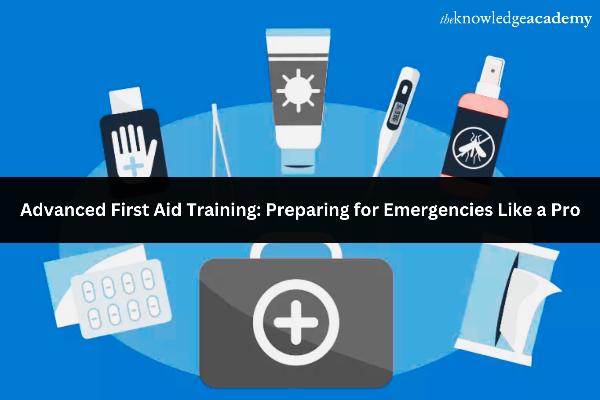Advanced First Aid Training: Preparing for Emergencies Like a Pro

Strong 8k brings an ultra-HD IPTV experience to your living room and your pocket.
When an emergency strikes, seconds can make a difference between life and death. Whether you're in a workplace, a public place, or even at home, having the right knowledge and skills to respond swiftly can be crucial. While basic first aid training is essential for everyone, Advanced First Aid Training takes these lifesaving skills to the next level. It equips individuals with a deeper understanding of emergency response, focusing on complex scenarios that go beyond simple cuts and bruises.
So, why is advanced training necessary, and how can it make a difference when things go wrong? Let's explore.
Table of Content
- What is Advanced First Aid Training?
- Why Advanced First Aid is Important
- Key Skills You'll Learn
- Advanced First Aid for Different Environments
- Who Should Take Advanced First Aid Training?
- Conclusion
What is Advanced First Aid Training?
At its core, Advanced First Aid Training is designed for those who need to manage serious medical emergencies until professional help arrives. It builds upon the foundational skills taught in basic first aid, covering more advanced medical situations like heart attacks, spinal injuries, and major trauma incidents. This training often includes the use of specialised equipment and an understanding of more complex medical conditions.
In essence, it's about being prepared for high-stress scenarios that require immediate attention, ensuring you can stabilise a patient before paramedics take over.
Why Advanced First Aid is Important
While basic first aid teaches the fundamentals of treating minor injuries, such as cuts and burns, advanced first aid prepares you for situations where time is critical. From administering CPR to recognising the signs of a stroke or heart attack, advanced training helps you:
- Respond effectively in life-threatening situations.
- Handle injuries that require more than just a bandage or antiseptic.
- Operate advanced medical tools like automated external defibrillators (AEDs) or oxygen delivery systems.
- Communicate efficiently with emergency services.
Consider a scenario where someone collapses from cardiac arrest. A basic first-aider might know how to initiate CPR, but someone with advanced training could operate an AED, maintain proper airway management, and potentially save a life before paramedics arrive.
Key Skills You'll Learn
Advanced First Aid Training covers a wide range of skills that go beyond the basics. Some of the most crucial ones include:
CPR and AED Use: Knowing how to perform chest compressions, rescue breaths, and use an AED to restart the heart.
Airway Management: Techniques like the recovery position or suctioning to maintain a clear airway in unconscious patients.
Treating Shock: Recognising signs of shock and stabilising the patient by elevating their legs and providing warmth.
Fracture and Spinal Injury Care: How to immobilise fractures and avoid further injury in patients with suspected spinal trauma.
Burn and Wound Management: Advanced wound care techniques to prevent infection and promote healing.
Managing Seizures: Handling a seizure safely and ensuring the patient's airway remains clear.
These skills allow individuals to handle more severe injuries and medical conditions confidently.
Advanced First Aid for Different Environments
One of the standout features of Advanced First Aid Training is its adaptability to different environments. Whether you're in a high-risk job, an outdoor setting, or simply want to be better prepared, this training can be tailored to your needs.
Workplaces: For industries like construction, manufacturing, or even large offices, the risk of serious injury is higher. Employees who are first aid certified can provide immediate assistance in the event of an accident, making a significant difference in outcomes.
Remote Locations: Advanced first aid becomes critical in remote or outdoor environments where emergency services may take longer to reach. Hikers, climbers, and outdoor enthusiasts often rely on these skills to manage accidents in isolated locations.
Schools and Public Spaces: Teachers, security personnel, and even regular citizens benefit from advanced training when dealing with emergencies like falls, playground injuries, or sudden illness.
Customising your training for specific scenarios enhances your ability to respond in a more targeted and effective manner.
Who Should Take Advanced First Aid Training?
Advanced first aid isn't just for medical professionals; it's for anyone who wants to be more prepared in emergency situations. Certain individuals and groups should especially consider this training:
First Responders: Police officers, firefighters, and emergency medical technicians (EMTs) often take advanced first aid courses to stay sharp and ready to act quickly in high-stakes situations.
Workplace Safety Officers: In high-risk industries, having an employee trained in advanced first aid is a requirement. These individuals can be the difference between life and death in an emergency.
Outdoor Enthusiasts: Whether you're hiking, camping, or working in remote areas, advanced training equips you to handle accidents and injuries when professional help is far away.
Parents and Caregivers: For those looking after children or elderly relatives, advanced training ensures you're ready to handle more severe accidents and health issues.
In a nutshell, advanced training is suitable for anyone who wants to improve their first aid skills and be prepared for more complex medical emergencies.
Conclusion
In a world where accidents and emergencies can occur anytime, being equipped with advanced first aid knowledge is invaluable. Whether it's providing immediate care for serious injuries, managing life-threatening medical conditions, or simply being a more confident responder in challenging situations, Advanced First Aid Training is a must for those who want to be proactive in helping others.
Note: IndiBlogHub features both user-submitted and editorial content. We do not verify third-party contributions. Read our Disclaimer and Privacy Policyfor details.



